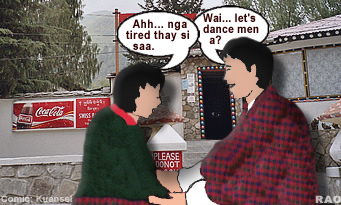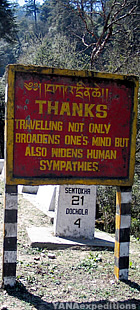|
Dzongkha:
Bhutan's national language
|
 |
Bhutan's
Culture: Dzongkha |
|
 |
Bhutan Information |
|
|
 |
|
Mixing
Languages - What's your kha?
|
 |
 |
| Party
mijo ga, gari chu ye ga and taxi thob chi ga, are common expressions used
by the Bhutanese people in everyday conversations.
Such
a mixture of languages, technically known as pidgin language, is a result
of borrowing foreign culture and practices says linguist and English language
lecturer, Kinley Dorjee, at the National Institute of Education, Paro. |
|
"Be
it with school students, youth and adults we all tend to have a soft corner
for these foreign cultures because we find them exotic," said Kinley Dorjee.
"And to go with the borrowed culture we have to borrow the language as
well."
Dzongkha
borrowing words from Hindi and lhotsamkha, according to Kinley Dorjee were
on a 'need-filling' basis driven by modern education, technological development,
and international relations.
"We
share borders with India and have a lhotsampa community in our country
and we need to communicate with them," Kinley Dorjee siad. "For these purposes
we borrowed languages from them."
According
to the lecturer there are three types of language borrowing; 'loan words',
'loan blend' and 'loan translation'.
Foreign
words borrowed into Dzongkha with slight changes only in pronunciation
like gari for vehicles, taem for time and are 'loan words'.
The
second type is 'loan blend' in which the meaning of words are borrowed
from English but the forms are adapted to the native tongue such as atali
for an orderly.
The
third type, which takes a lot of time, is 'loan translation', where the
meaning of a word is taken from the source language but is translated into
a native form, like jangthong for television and juthrin for telephone.
Kinley
Dorjee said that if loan translation was not done on time it would not
survive because by then loan words would have already taken its roots in
the language. Words like jangthong, juthrin and taxi were some of the examples
of delayed loan translation, according to Kinley Dorjee. "We cannot do
away with these words now," Kinley Dorjee said.
All
these factors, according to him made Dzongkha as a national language susceptible
to change.
However,
researchers and educationists across the country had different views.
 |
| According
to a lecturer in Sherubtse College, Mr. N Balasabraniam, translating words
into native language, when other countries had already coined them, was
a waste of time and resources. It only made the local language more complex
and incoherent.
Others
like Dr. Francoise Pommerat remarked that she received loads of e-mails
from her friends in France often asking her to rewrite paragraphs and words
of religious stories in the English edition of Kuensel, which extensively
used Bhutanese words.
A
Dzongkha expert committee member from the Dzongkha Development Authority
said that although Dzongkha as a spoken language existed centuries ago,
the written language was relatively new as it developed only in the early
60s with the beginning of country development process, under the command
of the late King, Jigme Dorji Wangchuck.
"No
matter how simple the words we coin are it is difficult to spread its use
among the people," said the DDA expert committee member. "People still
prefer using sabji baza for vegetable market, instead of tsoe sae throm." |
|
But
he stressed that coining new words in Dzongkha was important to preserve
the national language.
With
the phenomenon of borrowing among languages being inevitable, Kinley Dorjee
said that Dzongkha in the future could exist as a pidgin language.
If
borrowing went to the extreme, after a point of time Dzongkha could disappear,
he said.
"I
personally take it as a positive change because if we want to stop borrowing
we have to stop borrowing practices and way of life and this means total
stoppage in the development process of the country," he said.
English
language, he said, itself was a collection of borrowed languages from French,
Latin, German and Hindi.
"Unlike
many countries and communities, English has been very positive about borrowing
languages and change," Kinley Dorjee said. "Which is why it is easy to
learn and can be used to express better."
 |
| Contributed
by
Samten Wangchuk, KUENSEL, Bhutan's National Newspaper, 2006 |
| Information on Bhutan |
 |
| Links |
 |
 |
 |
External
Links |
|





